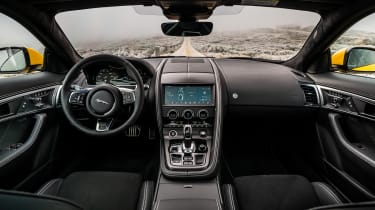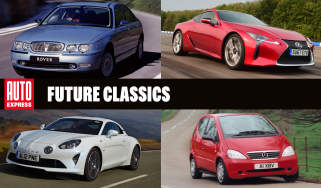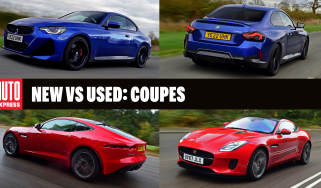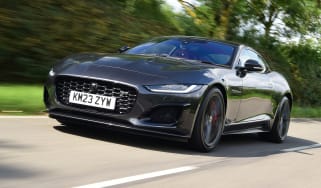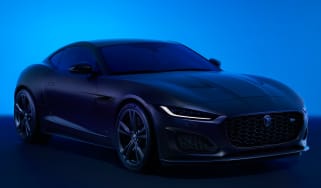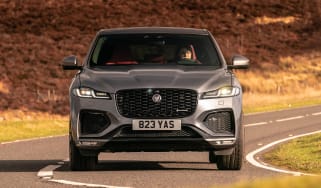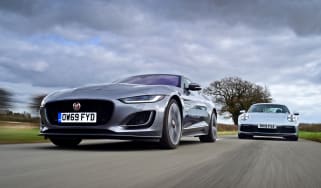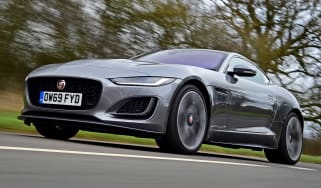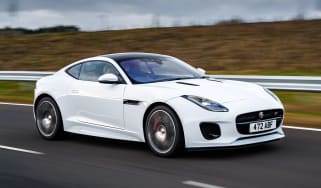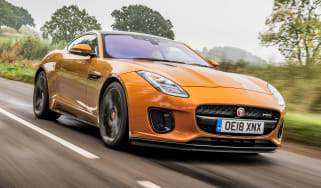Jaguar F-Type review
The Jaguar F-Type combines striking looks, fine handling and strong performance in a sports car package that is sure to tempt buyers

Despite being on sale for around a decade, the F-Type is still a thrilling sports car that handles superbly. Available either in coupe or convertible form, it has enough dynamic talent to stand toe to toe with rivals from the likes of Porsche, BMW and Mercedes, while buyers also have the choice of lighter, four-cylinder models or the bombastic V8 versions which feel every inch the super car.
The 2020 facelifted F-Type model not only looks sharper, but drives much better, too, with sweeter steering, a crisper chassis, a mildly improved interior and, in 575 R guise, thundering performance to match. If you're looking for one last hurrah to celebrate the combustion engine, along with plenty of driving fun, the Jaguar F-Type might be just the ticket.
About the Jaguar F-Type
When it first appeared in 2013, the F-Type quickly showed itself to be the perfect flagship sports car for Jaguar. Whichever version you chose, it gave a thrilling driving experience and was almost universally acclaimed as one of the best-looking sports cars on sale. Together, these two points explain the F-Type’s success, as it satisfied the demands of driving enthusiasts and the style-conscious in one package.
But, the rate of progress in the car industry has always been fast-paced, to a point where the F-Type was starting to feel dated. In order to catch up with its rivals from Germany and America, Jaguar unveiled a heavily revised model at the beginning of 2020.
Used - available now

2019 Volkswagen
Golf GTD
100,000 milesAutomaticDiesel2.0L
Cash £12,495
2023 Citroen
C5 Aircross
28,663 milesManualPetrol1.2L
Cash £14,897
2022 BMW
3 Series
30,268 milesAutomaticPetrol2.0L
Cash £18,000
2023 Ford
Kuga
35,613 milesAutomaticPetrol2.5L
Cash £17,100With the F-Type range priced to take sales from both the Porsche Boxster S/Cayman S and the larger 911, higher-spec F-Types provide more value for money, although you wouldn't be making a mistake if you picked the entry-level F-Type over one of its German rivals.
At the bottom of the range, the four-cylinder engine brings a welcome extra dimension to the line-up. And, if you’re thinking of a V8 F-Type, you can pick up a 4x4 version for around £5,000 more than the rear-drive version. The upgrade is worthwhile, because it makes the car safer and more secure without sacrificing any driving thrills.
Priced at more than £100k, the massively powerful 567bhp R flagship model is a serious investment, but in its favour it does have a top speed approaching almost 200mph. Previously, it didn't have the sharpness to beat the best of its rivals on the road, but the refreshed line-up feels much more honed, far lighter on its feet, and has a level of agility to its handling that was simply not there before.
Whether it's in coupe or convertible form, there aren't many cars for sale that can beat the Jaguar F-Type for head-turning looks. The 2020 revised model remains a striking piece of design that echoes the classic E-Type, while still delivering a contemporary feel. Previously available in F-Type, R-Dynamic, R-Dynamic Black or R specs, it's just the R-Dynamic and new 75 edition now included on the price list, with the performance R model sitting at the top of the range.
Power comes from a variety of engines. The entry point is the P300, which uses a 296bhp version of Jag's Ingenium 2.0-litre turbo, four-cylinder engine. The range then jumps to the P450 and P575, which both use Jaguar's powerhouse 5.0-litre supercharged V8 unit, making 444bhp and 567bhp, respectively.
The F-Type P300 is only offered with rear-wheel-drive, whereas the P450 V8 versions come with a choice of either AWD or rear-wheel-drive. The top-of-the-range P575 manages its monstrous 567bhp output by rather sensibly putting its power through all four wheels. All models use a revised version of Jaguar's great eight-speed auto transmission.
With price tags ranging from around £62,000 to more than £100,000, the F-Type has a lot of coupe and convertible rivals. Alongside competitors such as the Porsche Boxster and Cayman, buyers could look to more expensive versions of the Audi TT, BMW Z4 or Alpine A110, with cars like the Ford Mustang and BMW M2 also holding much appeal. At the top end of the range, the V8 F-Type is a cheaper (but still worthy) alternative to the Aston Martin Vantage, while the convertible version will have to face down the likes of the new Mercedes SL.
Engines, performance and drive
No matter what version of the F-Type you choose, you'll be rewarded with a superb driving experience. As it was developed as a convertible from the outset, there's very little twisting or vibration through the bodyshell, and body control in corners is excellent. But, it’s the new chassis modifications and improvements to the steering, in particular, that now define the F-Type.
Enhancing things further is plenty of strong grip, along with 50:50 weight distribution and either rear- or four-wheel drive. It all adds up to an extremely involving and agile car.
The overall result is still not quite as poised as a Porsche Boxster or Cayman, but the F-Type is an amazing car to drive nonetheless. What's different is that it blends superbly engaging performance with the sort of supple ride that makes cruising a pleasure. German rivals tend to adopt a more firmly sprung approach, which sometimes jars on Britain’s mixed bag of surfaces.
Four-wheel-drive cars are a real thrill. They feature an active system that generally sends only 30 per cent of torque to the front wheels, but feeds more in as the rear wheels lose traction. You don’t notice the added weight, and most of the time the car feels like it’s rear-wheel drive, but the extra grip and quick-witted 4WD system add to the fun, and the levels of grip are phenomenal.
0-62mph acceleration and top speed
The 2.0-litre four-cylinder engine is turbocharged, while the F-Type V8 versions basically use a re-map of the limited-run XE Project 8’s supercharged 5.0-litre unit.
That 2.0-litre unit in the P300 2.0 i4 is Jaguar’s Ingenium engine that's also used in the XE saloon and Land Rover's Discovery Sport. In the F-Type it makes 296bhp and 400Nm at just 1,500rpm. Top speed is 155mph, and 0-62mph arrives in 5.7 seconds.
The F-Type R, with its 5.0-litre V8, dispatches the 0-60mph sprint in 3.5 seconds (in coupe form) and hits a top speed of 186mph.
MPG, CO2 and running costs
Fuel economy is unlikely to be a big concern for those buyers lucky enough to be considering a Jaguar F-Type. Nonetheless, a stop/start system is standard on every model, and this helps to keep CO2 emissions to 214g/km for the 2.0-litre, four-cylinder P300 model, with a claimed 30.1mpg for the coupe also possible.
The rear-wheel-drive P450 V8 model produces a CO2 figure of 237g/km, with maximum fuel economy (under WLTP testing) at 27.2mpg. The AWD version is not quite as efficient, producing 242g/km and covering 26.7mpg. The range-topping R, costing almost £20k more than the P450, manages a respectable 27.0mpg, with a CO2 output of 239g/km.
Maintenance costs are pricey, but not out of the ordinary when compared to the F-Type's rivals. You can sign up to flexible service plans which help to spread the cost of scheduled maintenance.
Insurance groups
Insurance premiums for the F-Type are going to hit you hard in the pocket whichever way you look at it, so the question is how they compare to rivals.
The P300 Coupe sits in group 42, while the cabriolet version moves up to group 45. The Porsche Cayman is also in group 42, while the Porsche Boxster is positioned slightly higher than than the soft-top P300, at group 48. The V8-engined F-Type 75 R coupe is in insurance group 50.
Depreciation
Jaguar cars traditionally suffer from heavy depreciation, but the F-Type has shown itself to be a relatively strong performer on the used market. After a typical three-year/36,000-mile ownership period, the coupe model is predicted to be worth around 51 per cent of its original value, while the convertible lags behind a little on 47 per cent.
To get an accurate valuation on a specific model check out our free car valuation tool...
Interior, design and technology
The F-Type looks dramatic enough to be a worthy modern incarnation of the show-stopping Jaguar E-Type. The short tail and slim rear lights hint at its predecessor, but at the same time its lines are finely detailed and completely modern.
The car also looks perfectly in proportion from almost any angle. Desirability is almost as important as performance and handling in this class, and the F-Type has both in abundance. The soft-top is particularly elegant: its tight lines work perfectly with the body design, and it folds down electrically in just 12 seconds.
The entry F-Type trim (now discontinued) featured 18-inch alloy wheels as standard, while R-Dynamic trim included larger 19-inch wheels. Now, every version of the new F-Type gets 20-inch alloys of differing design, LED headlights and tail-lights, an electrically-adjustable steering column with a leather-trimmed wheel, six-way electric front seats finished in leather and suede and adaptive cruise control.
The aggressive 575 R has upgraded Pixel LED headlights and a bespoke bodykit, which includes gloss-black detailing on the side sills, front splitter and grille surrounds, while the beefier brakes are finished with red calipers. Inside, the steering wheel gains R branding, there’s so-called ‘Premium’ ambient lighting, and the seats are adjustable in 12 directions and now finished in Ebony Windsor leather.
Sat-nav, stereo and infotainment
Sat-nav and Bluetooth connectivity are standard on all models, and the revised ten-inch touchscreen system in the F-Type is far better than previous Jaguar efforts – although it’s still not up to BMW and Audi standards of usability.
There’s an all-new 12.3-inch main instrument display with switchable designs, which allows you to choose between a big central rev counter for track work, or more traditional twin dials for road use.
Jaguar has included a Meridian sound system as standard across all models, although there is a £1,000 option to upgrade to a more powerful unit. Apple CarPlay and Android Auto are included at no extra cost.
Practicality, comfort and boot space
You don’t buy a two-seater sports car for its boot space, and the F-Type has certainly substituted practicality for style.
But while there isn’t lots of space for luggage, the driver and passenger should be very comfortable. Even owners standing well over six feet tall can find a suitable driving position, thanks to a full range of adjustment from the comfy yet supportive sports seats and grippy steering wheel.
You sit low in the car, though, which means the extremities are hard to see during close-quarter manoeuvres. Jaguar has rather sensibly included a reversing camera as standard, as it’s quite difficult to judge where that shapely tail ends.
A deep storage bin and twin cup-holders on the centre console provide plenty of room for housing odds and ends on the move. The slim doors feature decent pockets, and the glovebox is a pretty reasonable size, too.
Other practical touches include a soft-top that can be raised or lowered at speeds of up to 30mph, which is very useful in Britain’s changeable climate.
Dimensions and size
In terms of dimensions, the F-Type sits somewhere between the compact Porsche Boxster and larger Porsche 911. The Jaguar is 4,470mm long, while the two Porsches measure 4,374mm and 4,481mm respectively.
The F-Type is wider than both, though – at 1,923mm, it’s roughly 12cm wider than the Boxster S and Porsche 911 Turbo. Park the cars side-by-side, and the Jaguar’s roof is also a few millimetres higher than both the Porsches’.
Leg room, head room & passenger space
Luggage space is pretty limited, but the cabin itself feels quite roomy, even though it’s snug and enveloping with the roof up. The F-Type is strictly a two-seater, unlike the Porsche 911, which has the advantage of occasional rear seats, and this might put some potential buyers off the Jaguar.
Boot space
The F-Type Convertible has a 132-litre boot, and while the capacity is unaffected by folding the roof, if you add the optional space-saver spare wheel, it takes up all of the room. The F-Type Coupe is a little more practical in this respect, and Jaguar claims it has a 336-litre loadspace, although with the narrow opening and rather shallow dimensions, this could be slightly optimistic. By way of comparison, the Porsche Boxster S' mid-engined configuration allows luggage compartments at both ends, for a total of 280 litres.
Reliability and safety
Initial teething troubles with the F-Type seemed to relate to the electronics, but a series of software updates has gradually ironed these out, and you shouldn’t have any problems if you decide to take the plunge.
Jaguar has amassed huge experience building aluminium chassis, and both the four-cylinder and V8 engines incorporate elements from the company's other models, so they certainly aren’t unknown quantities.
Not enough owners rated their cars for the F-Type to be included in our Driver Power satisfaction survey. However, Jaguar finished an encouraging sixth out of 29 manufacturers.
Safety is clearly at the top of the Jaguar agenda, and as the F-Type only seats two people, there's room for a pair of fixed rollover hoops in the roadster. It's also said to be the most rigid open-top car Jaguar has ever made.
Two-stage stability control is standard across the range, ensuring that even inexperienced drivers won't be caught out by the powerful rear-wheel-drive F-Types in adverse conditions. The P300 adds an open differential with torque vectoring for even better grip, and the V8 models go one better with an advanced electronically controlled diff. The torque-on-demand four-wheel-drive system on AWD cars works brilliantly to flatter drivers and provide secure access to all that power.
Stopping power isn't a problem, either: the V8 models feature the largest brake discs ever fitted to a production Jaguar. As with luxury items, though, some of the advanced active safety kit on the F-Type is optional: this includes the blind-spot warning system and rear-traffic monitor.
Warranty
Jaguars come with a three-year, unlimited mileage warranty as standard, but you can pay to extend it for up to five years’ cover. The picture is pretty similar across the board in the premium sector.
Servicing
You can get a three-year service plan, or a five-year, high-mileage scheme at extra cost, which are likely to be more cost-effective than paying separately each time your car requires a service.

